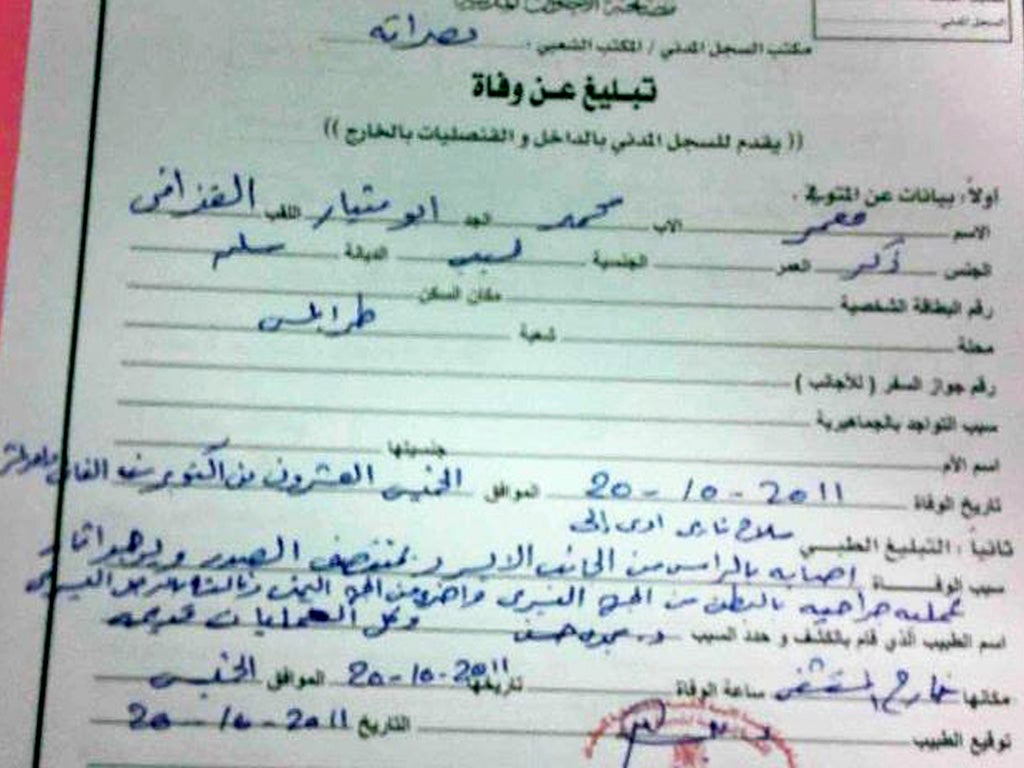Out of sight: Gaddafi buried as an outcast
NTC orders inquiry into killings of former dictator and son after they had been captured alive

Your support helps us to tell the story
From reproductive rights to climate change to Big Tech, The Independent is on the ground when the story is developing. Whether it's investigating the financials of Elon Musk's pro-Trump PAC or producing our latest documentary, 'The A Word', which shines a light on the American women fighting for reproductive rights, we know how important it is to parse out the facts from the messaging.
At such a critical moment in US history, we need reporters on the ground. Your donation allows us to keep sending journalists to speak to both sides of the story.
The Independent is trusted by Americans across the entire political spectrum. And unlike many other quality news outlets, we choose not to lock Americans out of our reporting and analysis with paywalls. We believe quality journalism should be available to everyone, paid for by those who can afford it.
Your support makes all the difference.The death, brutal and pitiless, had been made public with humiliating and gory details recorded on mobile telephones for international consumption. The funeral at dawn, by contrast, was a hurried and secret affair.
After four days when the bodies of Muammar Gaddafi and his son Muatassim were on display in a cold storage unit, the new Libyan administration ended the show yesterday and disposed of the morbid exhibits, proclaiming that the past was now truly buried.
There was time, however, for another piece of video footage, apparently showing the torture of the 69-year-old strongman in the moments before he died last Thursday. Then, just after 5am yesterday, the corpses of the father and son, along with the former defence minister, Abu Bakr Younis, who had been laid down in the same meat locker, were handed over to members of their families for the last rites.
Two nephews of Gaddafi and the sons of Younis were present when the former dictator's cleric, Khaled Tantoush, who had been captured with him during the attempt to flee the siege of Sirte, read out the prayer for the dead. The burials were away from a cemetery. The National Transitional Council (NTC) maintained that this was necessitated by a fatwa decreed by the country's ulama, senior religious figures, that Gaddafi was an apostate and thus could not be allowed into the resting places of true believers.
Mahmoud Shammam, the minister for information said: "This was something which had been decided by the experts. Their order was that the body should not be in a Muslim graveyard and it should not be buried in a known place in order to avoid sedition."
The latter point was of particular concern to the revolutionaries, who had repeatedly stressed that no shrine should be created. An earlier plan to hand the remains over to Gaddafi's tribe floundered because the elders refused to give guarantees that the internment would take place in the wilderness.
Burial at sea was ruled out because it was seen as too similar to the end of Osama Bin Laden, and the NTC did not want to be seen to be emulating the US. Thousands of Libyans, including families with young children, had filed past the bodies in Misrata. Officials at the port city, which had withstood a prolonged and vicious siege by regime forces, had ignored instructions from the NTC, worried by the adverse reaction the spectacle was provoking abroad, to draw the exhibition to a close.
Some, however, viewed the proceedings with increasing concern. Amr Yacoub al-Fishtan, one of the guards at the market complex where the bodies were being kept, said: "We had fought against his troops and they had done terrible things to Misrata. At first we felt it was only right that people here should see that he was finally gone. But then I saw all those turning up day after day, women, young boys and girls, and many of us were getting worried. It is a good thing that they have been taken away." Abdul-Mohammed Elshami, another fighter, added: "Also, it was getting smelly. The room is refrigerated and that made it not so bad for the first couple of days, but then it started getting bad."
Bowing to international pressure, the NTC's chairman, Mustafa Abdul Jalil, has ordered an investigation into the killings of the Gaddafis after they had been captured alive.
A post mortem on the former dictator by the country's chief pathologist concluded that death was due to a gunshot wound to the head.
His full report is due to be published later this week.
Few here believe, however, that anyone will be punished for the killings. An earlier inquiry into the assassination of Abdul Fatah Younis, the commander of the rebel forces in the east, had meandered to nothing.
"And he was a revolutionary chief," Mr Elshami pointed out. "Can you imagine anyone going to jail for killing Gaddafi who we all hated? This inquiry will vanish into the sand, like his body."
Join our commenting forum
Join thought-provoking conversations, follow other Independent readers and see their replies
Comments